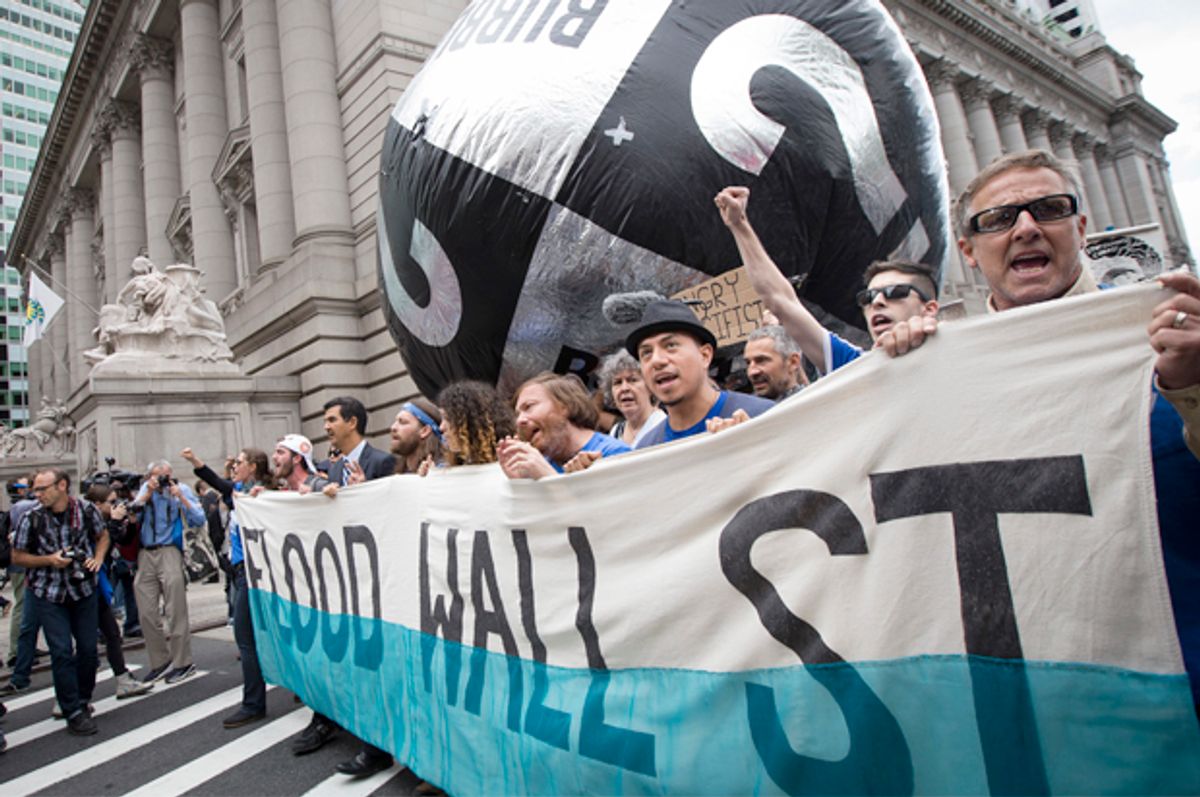The sun was shining on New York City's Battery Park Tuesday morning. Thousands of protesters gathered for the #FloodWallStreet march and protest, the committed leftists' counterpart to the more widely publicized People's Climate March that overtook the city on Sunday. #FloodWallStreet was at once encouraging, admirable -- and deeply frustrating. The organizers gave the protest an excellent focus -- and then seemed to leave that focus by the wayside.
The day started off peacefully enough, with music and swarms of reporters talking with protesters, and lots of police standing around and observing. But it wouldn't stay that way.
A little after noon, the crowd embarked from Battery Park, heading for the famous bull statue near Wall Street. I wasn't sure exactly what to expect from #FloodWallStreet after the People's Climate March the prior day, but I knew that a lot of people were planning to get arrested on Wall Street as an act of civil disobedience, a decision that could lead to considerable chaos, considering the New York police force's contentious relationship with the Occupy crowd. I felt that I should be there.
One of the most common critiques of the Occupy movement -- from both the left and the right -- was its unwillingness (or inability) to issue coherent demands. Indeed, beyond David Graeber's coinage of the terms for our society's increasingly stratified economy -- the "99 percent" and the "1 percent" -- Occupy might easily have come and gone without any clear slogan or idea to influence the popular consciousness. So I was excited and gratified to see that #FloodWallStreet adopted a clear and coherent demand, printed clearly on the bright blue T-shirts that protesters wore: "Stop Funding Fossils."
Truth be told, there is no single, simple Big Fix that can prevent the worst consequences of man-made climate change -- only a broad range of policy prescriptions will suffice. One of these, as Charles Komanoff recently detailed in Salon, might be a carbon tax: A properly progressive tax would force the marketplace to consider the consequences of atmospheric carbon when making cost-benefit analyses, enriching the most desperate Americans, spurring development of clean energy technologies, and creating new jobs. Likewise, pushing for the largest financial institutions in the world to divest from fossil fuels -- a position that basic self-preservation would suggest they ought to support. Whereas multinational oil corporations and the billionaires who've gotten fat off their profits will never commit the environmental equivalent of hari-kari, financial institutions have no natural reason to ally with fossil fuel producers beyond the profit motive. Some on Wall Street -- such as Robert Litterman, who chairs the risk committee for $2 billion hedge fund Kepos Capital -- even see the specter of a climate tax as the reason to divest from fossil fuels now. Public pressure on both fronts could lead to enormously positive results.
I'm not a community organizer -- or even a particularly seasoned activist -- and so throughout the day, I was inspired watching this incredible community of energized former-Occupiers, back together after three years but still working with shared purpose. There was a lot of "movement-building" taking place around me, and that shouldn't be blithely or cynically dismissed. I'm just baffled by the day's focus -- on high-profile mass arrests above more granular messaging. (And the decision to employ this tactic wasn't helped by reports this morning that protesters were subjected to retina-scanning technology to "document their involvement," as the NY Daily News put it.)
The message was right on those shirts: "Stop Funding Fossils #FloodWallStreet." A clear, direct demand for the denizens of Wall Street from its scruffy agitators. So ... happy ending and we can all go home, right?
Unfortunately, no.
The shirts were the beginning and the end of the "making demands" portion of the day-long protest. This was a missed opportunity of the tallest order. Framing the media-saturated action around a strong, crystal-clear demand could have been a watershed moment for climate activists, galvanizing moderate voices around an actionable strategy -- in stark contrast to the demand-free People's Climate March on Sunday.
Instead, the moment was squandered. Once people assembled in Battery Park, the only clear organizational priority was gathering, educating and supporting those individuals who planned on passive nonviolent resistance with the intent to provoke arrest. Pamphlets with maps, times and enjoinments to "Know your rights!" were eagerly passed out by organizers, but where were the pamphlets to help protesters contact politicians or find divestment actions tomorrow, and in the days that follow? Wall Street was turned into a prop, the very people and businesses who must be confronted just another symbol, like a flag, or a giant inflatable "carbon bubble," the stage on which our play takes place.
Could a march through New York City ever convince the biggest banks and financial firms in the world to divest from fossil fuels? With an estimated $20 trillion of oil still underground and underwater, it doesn't seem that likely. Then again, even most protesters don't expect their demands to be met due to marches and chants alone. If we want to successfully slow climate change, we will need more than the comforting pageantry of the Grand March:
#FloodWallStreet about to learn a song and then will sing together. This will be beautiful. Livestream: http://t.co/cHXPEgvqa1
— Marianne Manilov (@MSQRD) September 22, 2014
We're going to need a strong, cohesive message that we can hammer into the ground, until we have a real victory that we can build upon.
So how about next time, we start with "Stop Funding Fossils" -- and worry less about camera-friendly theatrics?



Shares